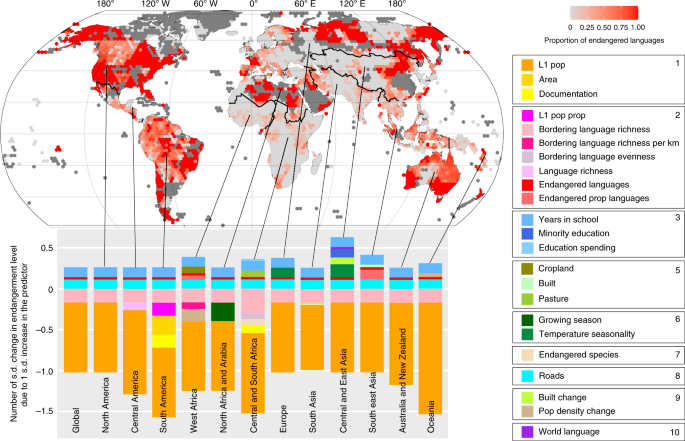
Language is a crucial element of human identity and serves as a vessel for cultural heritage. The extinction of a language goes beyond the loss of words; it signifies the erasure of a cultural identity, traditional knowledge, and unique worldviews. Approximately every two weeks, a language dies, leading to significant cultural consequences as entire ways of life and understandings of the world vanish along with it[8][9].
Loss of Cultural Identity and Heritage

Languages are intimately linked to the identities of their speakers. Each language carries unique cultural markers, traditions, and narratives that define a group's heritage. When a language becomes extinct, it often results in the obliteration of the cultural practices, ceremonies, and social structures associated with that language. For instance, terms that denote kinship and community relationships can vanish, disrupting the social fabric that binds community members[8]. Furthermore, unique cultural expressions, such as oral traditions, stories, and rituals, are intricately tied to language. As these languages fade, the rich tapestry of cultural identity loses its threads, leading to a more homogenized world that lacks diversity and richness[8][9].
Knowledge and Wisdom at Risk

Indigenous languages, in particular, hold vast reservoirs of ecological and cultural knowledge accumulated over centuries. These languages often encapsulate intricate understandings of local ecosystems, medicinal practices, and sustainable living principles. The extinction of such languages risks not only the loss of specific knowledge but also the loss of entire frameworks for understanding and interacting with the environment. For example, indigenous languages frequently contain key knowledge about biodiversity, ecological practices, and climate adaptations[8]. The disappearance of these languages leads to the erosion of local wisdom that is crucial for addressing contemporary environmental challenges[8][9].
Historically, languages have been the primary means of transmitting knowledge from generation to generation. When a community’s language dies, it often results in a significant gap in the intergenerational transfer of this knowledge, diminishing the community's resilience and adaptability. As one source notes, “the loss of traditional knowledge... diminishes humanity’s cultural diversity and resilience”[8]. Language extinction thus poses a severe threat not only to the speakers but to the broader global community that relies on such diverse ecological insights.
Misconceptions About Language and Culture

There is a compelling narrative that losing a language equates to losing cultural identity. However, recent studies suggest this perspective may sometimes be oversimplified. For instance, in Australia, many Indigenous individuals now communicate in English or creole languages, and they still find ways to express cultural identity and values in these new contexts[7]. Linguistic adaptability indicates that, while languages may change or evolve, cultural expressions can persist in new linguistic forms. This perspective is vital for understanding the complexity of cultural identity in modern, multilingual societies, especially those influenced by colonial histories[7].
Social and Psychological Implications
The social dynamics surrounding language use can also impact community cohesion and individual identity. Communities may face linguistic stigma, where speakers of minority languages feel marginalized or judged for their linguistic choices. Such pressures can lead to language avoidance among younger generations, further driving the cycle of language loss[7][8]. Negative perceptions surrounding the capabilities of heritage speakers result in insecurity and reluctance to use their native tongue, which can have damaging effects on their self-identity and interconnectedness within their communities[2][4].
Moreover, the imposition of dominant languages through formal education systems and societal norms often sidelines minority languages, creating environments where the latter are devalued[2][4][5]. The intertwined nature of language, identity, and cultural expression means that the pressures to conform to a dominant language not only endanger minority languages but also threaten the cultural identities they represent.
Revitalization Efforts

Amidst the challenges of language extinction, various revitalization efforts are being constructed to support endangered languages and their associated cultures. These efforts emphasize the importance of community engagement and linguistic pride in combating the neglect or loss of heritage languages[5][9]. For example, successful revitalization strategies include language nests, master-apprentice programs, and community-based educational initiatives designed to stimulate interest and fluency among younger generations[5][9]. Such programs aim not only to preserve the language but to empower its speakers by reaffirming the connection between language, culture, and identity.
The overarching goal of these initiatives is to counter the trend of language loss and to celebrate the rich diversity that each language contributes to humanity. As highlighted in various discussions, the collective efforts necessary to revive and maintain endangered languages ultimately serve to reinforce cultural identities, echoing the sentiment that “if we are to survive, to continue on...then we have to have a language”[9].
Conclusion
The extinction of a language has profound implications for culture, identity, and community knowledge. With each disappearing language, unique worldviews, histories, and ecosystems of knowledge risk being lost forever. As society grapples with these issues, understanding the intrinsic relationship between language and culture becomes imperative for fostering a world that values diversity and promotes inclusive efforts toward language preservation. The ongoing dialogue about language revitalization serves as a reminder of the resilience of cultural identity and the vital role that languages play in shaping the human experience.
Get more accurate answers with Super Pandi, upload files, personalized discovery feed, save searches and contribute to the PandiPedia.
Let's look at alternatives:
- Modify the query.
- Start a new thread.
- Remove sources (if manually added).